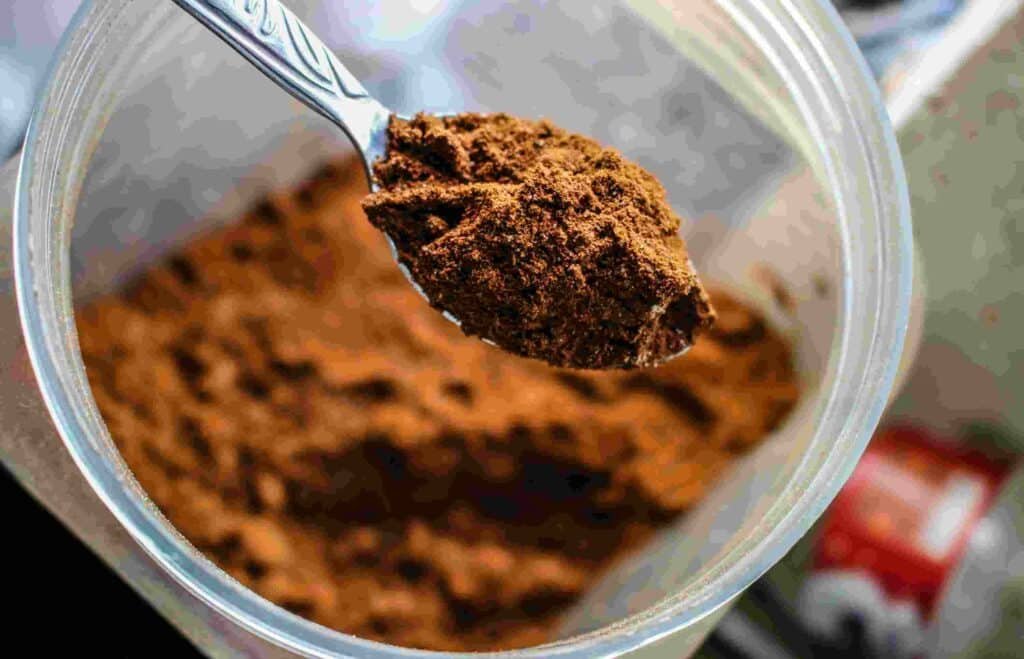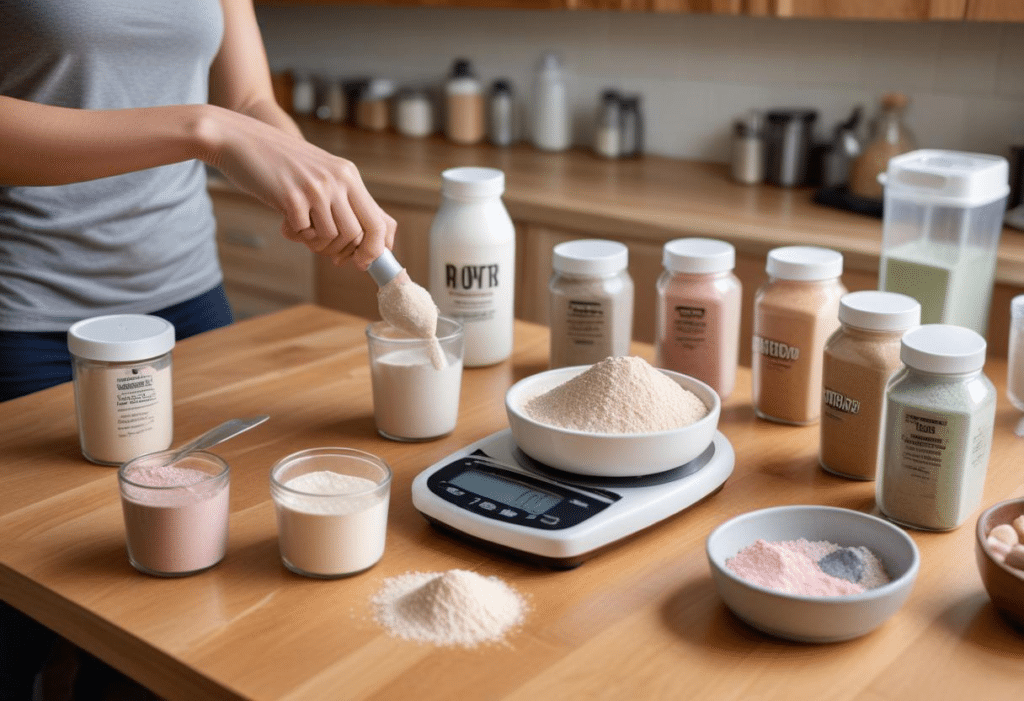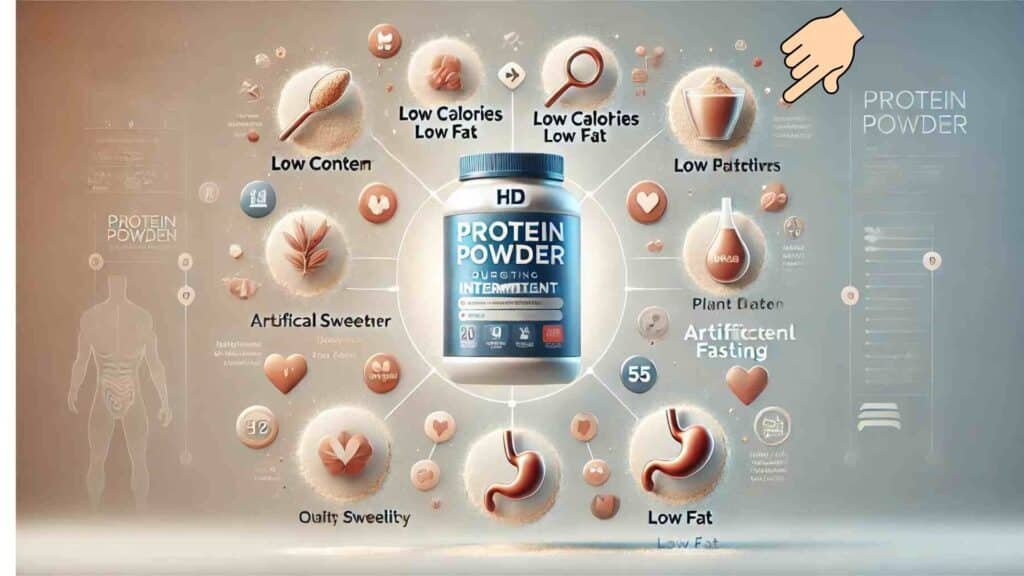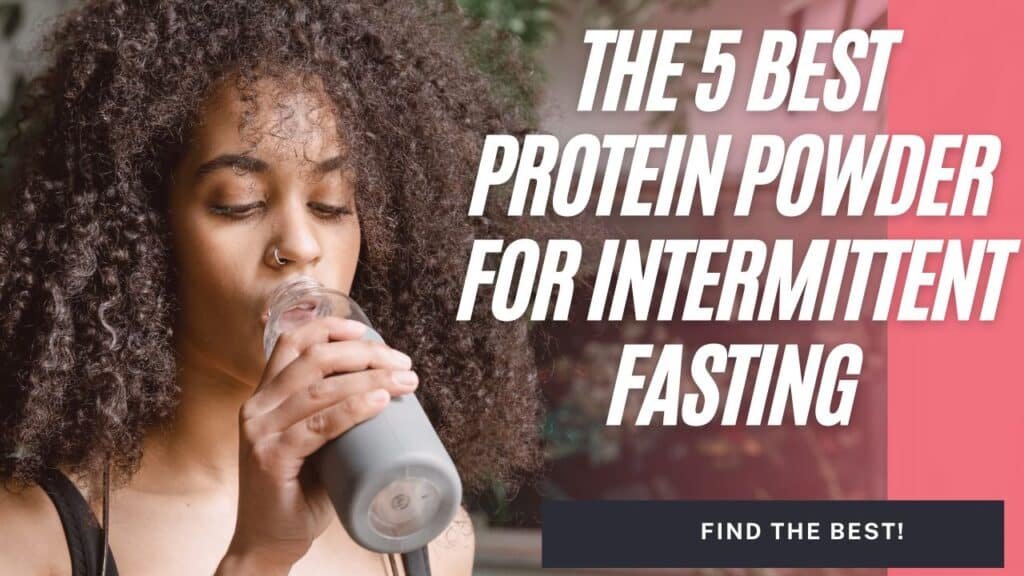Intermittent Fasting
Intermittent fasting (IF) has surged in popularity over the past few years, largely due to its numerous purported benefits, including effective weight loss, improved metabolic health, and enhanced overall well-being. However, a common concern that arises for those practicing intermittent fasting is how to maintain muscle mass and fulfill daily protein requirements during fasting periods. The key to addressing this concern is making informed choices regarding protein supplementation. This blog explores the most effective and the best protein powder for intermittent fasting tailored for those engaging with consistency and highlights how they can bolster your fitness journey.

Why Protein is Essential During Intermittent Fasting
The best protein powder for intermittent fasting is essential
, as they offer a potent source of protein, a crucial nutrient for repairing and building muscle. During your fasting period, the body may start breaking down muscle tissue for energy, a process known as muscle catabolism. Incorporating protein powders during your eating windows can significantly counteract this breakdown while promoting muscle protein synthesis, helping you preserve or even increase muscle mass.
Intermittent fasting involves alternating periods of fasting and eating, making it crucial to prioritize protein intake during your eating windows. Here are several compelling reasons why protein is indispensable in this scenario:

1. Preservation of Lean Muscle Mass: While fasting can promote weight loss, it may also lead to a loss of muscle mass if protein intake is insufficient. Adequate protein consumption helps retain muscle, as it provides the necessary building blocks (amino acids) for muscle preservation.
2. Muscle Repair and Growth: Exercise, particularly resistance training, can lead to microscopic damage in muscle fibers. Consuming protein post-workout aids in the recovery, repair, and growth of these muscles, enhancing overall strength and physical performance.
3. Support for Overall Health and Energy Levels: Protein plays a key role in various bodily functions, including hormone production, immune system support, and maintenance of healthy skin, hair, and nails. By meeting protein needs, you can sustain your energy levels throughout the day, which is crucial during fasting.
4. Improvement in Body Composition and Fat Burning: A higher protein intake is correlated with improved body composition, as it can help reduce body fat while supporting muscle maintenance. Furthermore, protein-rich diets can increase thermogenesis, helping to enhance fat burning.
The Science of Protein Pacing
An important concept to understand is protein pacing, which refers to the strategic consumption of enough protein throughout your periods of eating to maximize muscle protein synthesis. This is particularly beneficial when following a caloric restriction, as it ensures your body receives the necessary nutrients to stimulate muscle growth during your fasting period. The science of protein pacing during intermittent fasting highlights the strategic timing and distribution of protein intake to maximize health and performance benefits.

Protein pacing involves consuming high-quality dietary protein in regular intervals to support muscle maintenance, fat loss, and metabolic health, especially during fasting periods. By prioritizing protein-rich meals during eating windows, the body is better equipped to sustain muscle mass while promoting fat oxidation. Also, protein pacing helps regulate hunger hormones like ghrelin, reducing cravings and making fasting more manageable. This approach not only complements intermittent fasting but also enhances its effectiveness by fueling the body with essential nutrients in an optimized manner.
How Much Protein Do You Really Need?
The question often arises – how much protein is enough for optimal health and muscle maintenance? For healthy adults, the general recommended dietary allowance (RDA) is about 0.8 grams of protein per kilogram of body weight. However, for active individuals, particularly those engaged in strength training or other intensive workouts, protein needs can significantly increase. Some experts suggest that aiming for 1.2 to 2.2 grams of protein per kilogram of body weight may be more appropriate for these individuals, depending on activity levels and specific fitness goals.
By understanding the role of protein in your intermittent fasting regimen and carefully selecting the right protein powders, you can effectively preserve muscle mass and support your overall health. Whether you’re a fitness enthusiast or simply looking to improve your well-being, adding the best protein powder for intermittent fasting can significantly enhance your experience.
Choosing the Best Protein Powder for Intermittent Fasting
Protein powder can be a valuable addition to your diet during intermittent fasting, especially if you’re looking to maintain muscle mass and support recovery. Since it’s low in calories and quickly absorbed, whey protein and other few proteins fit well within the eating window, providing a high-quality source of essential amino acids. Consuming it after breaking your fast or post-workout helps fuel your muscles, promotes satiety, and keeps you energized.

However, it’s important to use the protein powder strategically, to ensure it complements your overall calorie and nutrient goals for the day. When paired with a balanced diet, whey protein can enhance the benefits of intermittent fasting without disrupting your progress. Not all protein powders are created equal. The best protein powder for your intermittent fasting plan will depend on factors like personal preferences, dietary restrictions, and fitness goals. Let’s explore some excellent choices:
1. Whey Protein
– Benefits: Whey protein is renowned for its high concentration of essential amino acids, which are crucial for muscle growth and recovery. It is quickly absorbed by the body, making it an optimal choice for post-exercise nutrition. Incorporating whey protein after workouts can effectively kickstart muscle protein synthesis, aiding in faster recovery and growth, especially beneficial for athletes and fitness enthusiasts.
– Cost: Generally, ranges from $25 to $40 for a 2-pound container, depending on brand and formulation.
– Top Picks: Some highly recommended options include *Optimum Nutrition Gold Standard*, known for its rich flavor and quality, and *Dymatize Whey Protein*, which offers a variety of flavors and blends well in shakes.
2. Plant-Based Proteins
– Benefits: Plant-based proteins are perfect for individuals who are lactose intolerant or prefer to avoid dairy. They come from sources such as peas, brown rice, and other vegetarian blends that provide a comprehensive amino acid profile. In addition to supporting muscle maintenance and growth, they are also gentle on the digestive system, often being easier to digest than animal-based proteins.
– Cost: Prices range from approximately $20 to $35 for a 2-pound container, making it an accessible option for many.
– Top Picks: Recommended brands include *Garden of Life Organic Protein*, which features organic ingredients and a diverse amino acid profile, and *Vega Sport Premium Protein*, favored for its clean formula and range of flavors.
3. Casein Protein
– Benefits: Casein protein is characterized by its slow digestion rate, which makes it ideal for consumption before fasting periods, such as the last meal before bed. This slow release of amino acids supports sustained muscle repair throughout the night, helping to prevent muscle breakdown during extended fasting times. It can also aid in reducing hunger, thus making it easier to adhere to dietary restrictions.
– Cost: Typically costs between $30 and $45 for a 2-pound container.
– Top Picks: Good options include *Naked Casein*, recognized for its minimal ingredients and high purity, and *Optimum Nutrition Casein*, which is praised for its great taste and effectiveness.
4. Collagen Protein
– Benefits: Collagen protein is an excellent supplement for those looking to improve their skin elasticity, joint health, and muscle tissue repair. Generally low in calories, collagen not only supports beauty from within but also contributes to overall health and wellness. It’s particularly beneficial for those engaged in regular physical activity, as it helps maintain the integrity of connective tissues.
– Cost: Around $20 to $40 for a 1-pound container, which tends to last about a month with regular use.
– Top Picks: Consider brands like *Vital Proteins Collagen Peptides*, well-known for its high-quality, easily dissolvable formula, and *Ancient Nutrition Multi Collagen*, which sources collagen from multiple types for a more comprehensive approach.
5. Protein Water
– Benefits: Protein water offers a refreshing and hydrating way to augment your daily protein intake without the added calories typical of protein shakes. It is usually free from artificial sweeteners and sugar substitutes, making it a healthful choice for anyone looking to supplement protein conveniently during their eating period. This drink can be especially appealing for those on the go or seeking a light option post-workout.
– Cost: Usually priced between $2 and $4 per bottle, making it an affordable option for hydration and nutrition.
– Top Picks: Two standout options are *Premier Protein Water*, which combines great taste with nutritional benefits, and Protein2o, known for its clean ingredient list and variety of refreshing flavors.
A Revolutionary Guide for Intermittent Fasting for Women
Are you ready to transform your health, boost your energy, and achieve your wellness goals? Intermittent Fasting for Women, now available on Amazon Kindle, is your ultimate companion to mastering the art of fasting tailored specifically for women.
This book dives deep into the science behind intermittent fasting, addressing the unique hormonal, metabolic, and lifestyle needs of women. With practical tips, easy-to-follow schedules, and meal plans designed to fit your busy life, this guide will empower you to embrace fasting as a sustainable lifestyle, not a restrictive diet. Whether you’re a beginner or looking to refine your approach, this book is packed with actionable insights and inspiring success stories to keep you motivated. Don’t miss the chance to redefine your health journey,
Download Intermittent Fasting for Women on Kindle today and start your path to vitality and balance!
Benefits of Using Protein Powder During Intermittent Fasting
Having the best protein powder in your intermittent fasting Journey, especially for endomorphs who may need extra support to maintain muscle mass and manage hunger, can provide numerous benefits that enhance your overall health and fitness journey.
Here are several important advantages to consider:
– Convenience: Protein drinks offer a practical and easy way for those on the go or with busy schedules. They provide an efficient way to ensure you meet your daily protein intake without consuming excessive calories, making meal prep easier and less time-consuming.
– Muscle Maintenance: Maintaining a calorie deficit can sometimes lead to muscle loss. However, adequate protein intake is crucial for muscle preservation. Using protein powder helps you consume the necessary protein essential for supporting lean body mass, especially during periods of reduced calorie deficit.

– Balanced Nutrition: Many protein supplements are not just sources of protein but also include essential vitamins, minerals, and healthy fats. This makes them suitable for use as meal replacement shakes, providing a balanced blend of macronutrients to support a well-rounded diet while intermittent fasting.
– Improved Insulin Sensitivity: High-protein diets can significantly enhance metabolic health by helping to stabilize insulin levels throughout the day. This stabilization can improve your body’s ability to manage blood sugar and therefore may assist in reducing cravings and hunger during fasting periods.
Key Considerations When Choosing Protein Powder
Selecting the right protein powder can greatly influence your fasting experience. Here are some important factors to consider:
1. Ingredients: When evaluating protein powders, it is a great way to choose those with minimal food intake, fillers, and artificial sweeteners. These ingredients can lead to digestive disturbances and may not align well with your health goals. Always check the ingredient list for transparency.
2. Protein Source: Consider the source of protein that aligns excellent choice with your dietary preferences and needs. If you follow a plant-based diet, opt for whole food protein sources such as pea protein or brown rice protein. Alternatively, if you’re focused on a high-protein diet, whey protein might be a preferable choice due to its rich amino acid profile.

3. Protein Content: To adequately support muscle repair and growth, look for protein powders that provide at least 20-30 grams of protein per serving. This ensures you are getting enough protein to meet your physiological needs, especially during calorie restriction.
4. Calorie Count: Keep an eye on the calorie content of the protein powder you select. Monitoring your overall calorie intake is crucial to prevent any unintended weight gain, particularly within the limited eating window associated with intermittent fasting.
5. Dietary Restrictions: It’s essential to consider any dietary restrictions you have. Whether you require a lactose-free option, gluten-free formulation, or a product free from sugar substitutes, ensure that the protein powder aligns with your unique dietary needs.
How to Use Protein Powder in Your Intermittent Fasting Plan
There are strategic ways to incorporate protein powder effectively into your intermittent fasting regimen:
– During Your Eating Window: When you break your fast or eat during your designated eating window, consider blending protein powder into shakes with whole foods or egg whites. Adding ingredients like almond butter, spinach, and chia seeds not only enhances the nutritional profile but also contributes healthy fats and fiber, promoting satiety. With the best protein shake and average intake of food during the fasted state, you won’t be facing any digestive issues.
– Post-Fast: After fasting, it’s a good practice to start your meal with a protein drink. This approach can aid in muscle protein synthesis, helping to refuel your body after fasting and replenish your energy levels.
– Before Fasting Periods: Using casein-based protein supplements before you enter a fasting period can also be beneficial. Casein digests slowly, providing a gradual release of amino acids, which helps you feel fuller for extended periods and may reduce hunger pangs during fasting hours of the day.
Consult a Registered Dietitian or Healthcare Provider
When it comes to the best protein powder for intermittent fasting, before making significant alterations to your dietary habits or pursuing specific fitness goals, it is advisable to consult a registered dietitian or healthcare provider. They can offer personalized guidance tailored to your unique health profile and lifestyle, particularly if you have pre-existing conditions such as kidney disease or if you’re an older adult aiming to maintain muscle mass. A professional can help you devise an intermittent fasting plan that optimally supports your nutritional needs and general wellness.

Does protein powder break a fast?
Yes, protein powder breaks a fast. Protein powders contain amino acids that stimulate insulin secretion and activate digestion, which disrupts the fasting state. To maintain your fast, consume protein powder only during your eating window.
What is the best time to take protein powder during intermittent fasting?
The best time to consume protein powder is during your eating window. If you break your fast after a workout, taking a protein shake immediately can support muscle recovery and growth.
Which type of protein powder is ideal for intermittent fasting?
The best protein powders depend on your dietary needs:
Whey protein: Fast absorption and rich in amino acids, ideal for muscle building.
Plant-based protein (pea, hemp): A good option for vegans or those with lactose intolerance.
Collagen protein: Supports skin and joint health while being easy on digestion.
Can protein powder help with weight loss during intermittent fasting?
Yes, protein powder can aid weight loss by promoting satiety, preserving muscle mass, and supporting metabolism. Choose low-calorie options like whey isolate or plant-based powders without added sugars or fillers.
Can I drink protein shakes before fasting to stay full longer?
Yes, consuming a protein shake before starting your fasting period can keep you satiated for longer. Protein takes longer to digest, reducing hunger pangs during your fast. Combine it with healthy fats (like almond butter) for sustained energy.
How should I time my protein intake during intermittent fasting?
It’s recommended to consume protein-rich meals or shakes at the beginning of your eating window to kickstart your metabolism and support muscle recovery. If you exercise during your fasting period, refuel with protein as soon as your eating window opens to aid in muscle repair and growth.
Conclusion
The Best Protein powder for intermittent fasting is a versatile and practical tool to enhance your journey. Whether you’re aiming for weight loss, improved metabolic health, or muscle growth, choosing the right protein sources can make all the difference. With options like whey protein, plant-based proteins, and meal replacement shakes, there’s something for everyone. So, make an informed choice and take a step closer to your fitness goals!



